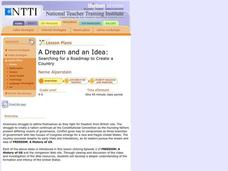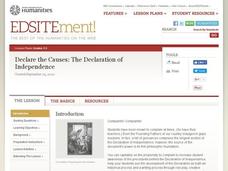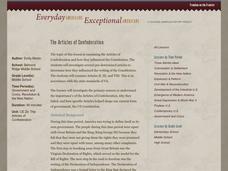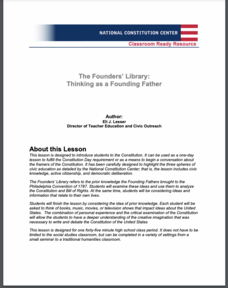Curated OER
A Famous Signature
Learners study important historical figures. In this United States history instructional activity, students trace the signature of John Hancock using cotton swabs, glitter, and various art supplies after discussing the historical...
Curated OER
Electricity and Magnetism: Ben Franklin and His Influence
Fourth graders explore electricity by examining the life of Benjamin Franklin. In this biographical lesson, 4th graders listen to the teacher read facts of Benjamin Franklin's life and analyze his contributions to our current society. ...
Curated OER
A Dream and an Idea: Searching for a Roadmap to Create a Country
Students compare and contrast opposing visions of government held by the founding fathers. They evaluate the roles of historical leaders in shaping the U.S. as an emerging nation.
Curated OER
American Studies
Entitled American Studies, this small unit covers various topics related to the study of the United States. Learners warm up by creating a dictionary of democracy, then dive into three different lessons focused on government, famous...
Curated OER
United States Constitution Framers
Eighth graders discover details about delegates to the American Constitutional Convention. In this U.S. Constitution lesson, 8th graders research information about 9 delegates to the convention and then write paragraphs about the most...
Curated OER
The Founding Fathers
Students discuss the basic ideas about the government of the English colonists. They identify three kinds of colonial government developed in the thirteen colonies.
Curated OER
Colonial Founders
Who were the founding fathers of the American Colonies? Engage in online activities, Internet research, and focused writing to find out. Students choose one colonial founder, conduct biographical research on the person, and take a quiz...
Benjamin Franklin Tercentenary
Benjamin Franklin: Master Diplomat for One Last Time
At 81, Benjamin Franklin was the oldest delegate to the 1787 Constitutional Convention, where he exercised significant influence in shaping key elements of how the United States operates. The class examines his role, using “The Scene at...
National Endowment for the Humanities
Lesson 4 James Madison: Internal Improvements Balancing Act—Federal/State and Executive/Legislative
Who has the power? The founding fathers asked the same question when the United States was formed. Learners explore issues that arose during Madison’s presidency that raised constitutional questions. Through discovery, discussion, and...
Curated OER
Learning the Blues
Students take a virtual field trip to Memphis, Tennessee in their study of the blues, its characterisitics, founding fathers, and histororical influence on modern music. They compose blues lyrics that reflect present-day attitudes and...
Curated OER
Declare the Causes: The Declaration of Independence
Students study the Declaration of Independence and the process our founding fathers went through to get it written and signed. They analyze other similar historical documents and draft and present their own declarations.
Curated OER
Why A Bill of Rights?
Examine conflicting viewpoints in this lesson plan, in which middle schoolers write their own proposal for including a Bill of Rights in the Constitution. As a class, they discover how the Bill of Rights was not a planned document to be...
What So Proudly We Hail
Life, Liberty, and the Pursuit of Happiness: A Lesson on the Declaration of Independence
What does it mean to say that a right is unalienable? How did the founding fathers convey this revolutionary concept in the Declaration of Independence? Engage in a close reading and analysis of the Declaration of Independence, and...
Curated OER
What is Meant by Returning to Fundamental Principles?
What did the Founding Fathers mean by the importance of continually returning to fundamental principles? Your young historians will analyze a series of quotations illustrating the fundamental ideals and principles of the United States...
Judicial Branch of California
Protecting our Freedoms: The Bill of Rights
Take to the stage! Integrate both drama and civic skills by asking pupils to create and perform skills that demonstrate the importance of the amendments in the Bill of Rights. After reviewing the Preamble to the Constitution, learners...
PBS
Amid Rising Economic Inequality, Does America Need a Third Reconstruction?
Young political scientists investigate the Poor People's Campaign protest held in Washington, D.C., on June 18, 2022. They research how the event was reported in various news outlets and consider their stance on whether "poverty is...
Curated OER
Papa's Got A Brand New Bag
Students design and promote technological devices for Father's Day gifts that reflect evolving social trends. They consider the new image of dads cast by today's media and advertisements and its influence.
Curated OER
We the People... How Does Government Secure Natural Rights?
Students investigate the Founders' ideas about what kind of government is most likely to protect the basic rights of people. They distinguish between limited and unlimited government.
Roy Rosenzweig Center for History and New Media
The Articles of Confederation
Have you ever started a project only to realize you need to scrap it and start over? Scholars analyze the issues leading to the fall of the Articles of Confederation. A group investigation into Articles II, III, and VIII unveil the...
Curated OER
The Founders’ Library: Thinking as a Founding Father
Students analyze the U.S. Constitution and the Bill of Rights. In this U.S. government instructional activity, students examine books, movies, and music that influence them today and then investigate writings that influenced the framers...
Benjamin Franklin Tercentenary
What Ben Read
Just what did Ben Franklin read? By juxtaposing Ben Franklin’s reading material as a young man with an analysis of his developed ideas, learners gain the opportunity to see how the influences of his youthful reading played out. Roman,...
National Endowment for the Humanities
Creating the Office of the Presidency
The United States needed an executive power, but it wanted to avoid a monarchy. Using James Madison's notes on the Constitutional Convention, young historians look at the juggling act the Founding Fathers did to create a role for the...
Curated OER
U.s. Constitution Roll Call Test
Students act as newspaper reporters from 1787 and interview some of the signers of the Constitution. They study the contributions of these Founding Fathers: Washington, Franklin, Madison, Hamilton and discuss the purpose of the U.S....
Curated OER
George Washington: Founding Father
Learners explore George Washington. Focusing on his personal life, it offers an examination of the man behind the towering symbol. Washington's stature as first president and founding father created a public persona. George
Other popular searches
- Our Founding Fathers
- Founding Fathers Game
- The Founding Fathers
- Bible and Founding Fathers
- Founding Fathers Project
- Founding Fathers Debate
- Founding Fathers Art
- Founding Fathers Fame
- Founding Fathers Gfame
- Founding Fathers Ideals
- Founding Fathers of Us

























